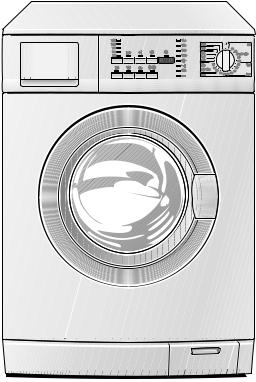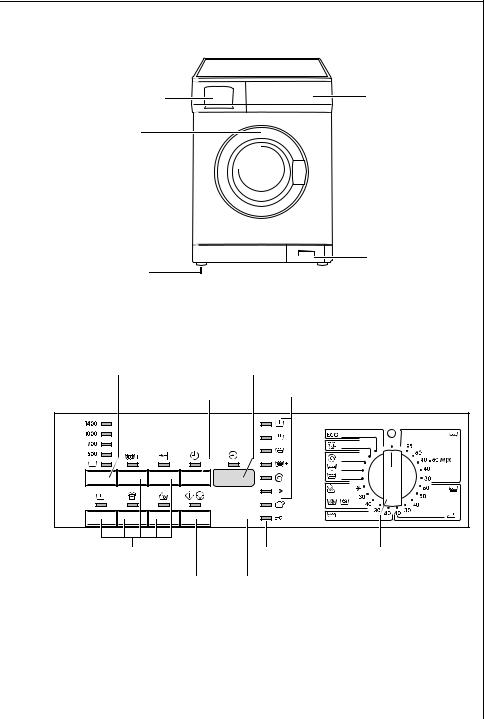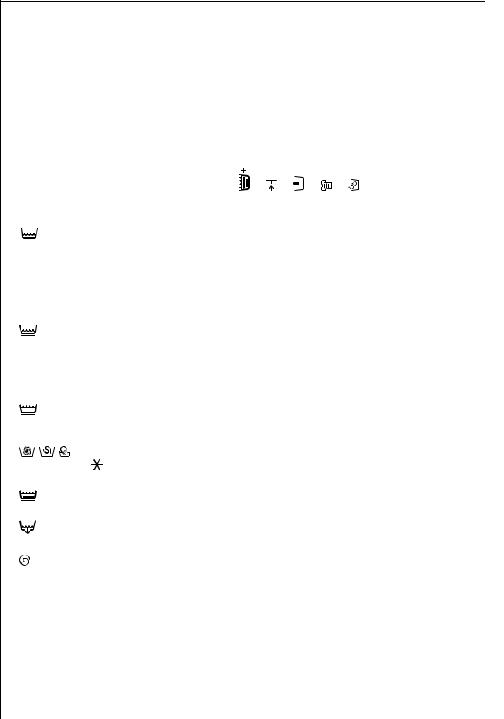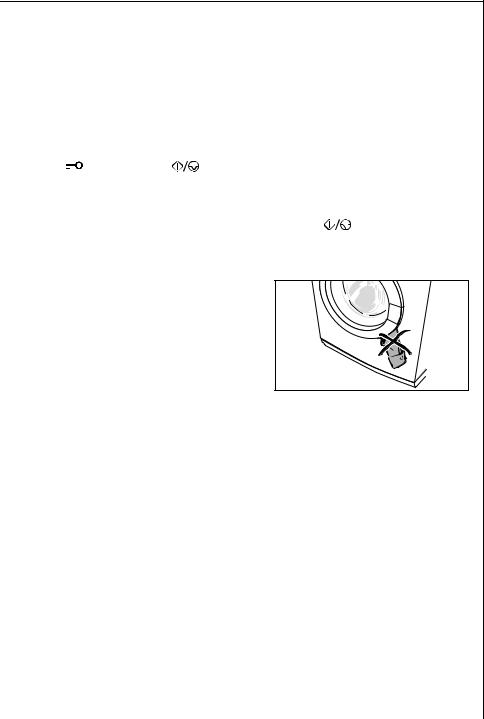AEG LAVAMAT 74610 User Manual

LAVAMAT 74610
Washing machine
User information

Dear customer,
Please read this User Information carefully and keep it to refer to at a later date.
Pass this User Information on to any subsequent owner of the appliance.
The following symbols are used in the text:
1 Safety instructions
Warning: Notes that concern your personal safety.
Attention: Notes that show how to avoid damage to the appliance.
3 Useful tips and hints
2 Environmental information
2

Contents |
|
Operating Instructions. . . . . . . . . . . . . . . . . . . . . . . . . . . . . . . . . . . . . |
5 |
Safety . . . . . . . . . . . . . . . . . . . . . . . . . . . . . . . . . . . . . . . . . . . . . . . . . . . . . . . . . |
5 |
Description of the appliance . . . . . . . . . . . . . . . . . . . . . . . . . . . . . . . . . . . . |
7 |
Control panel . . . . . . . . . . . . . . . . . . . . . . . . . . . . . . . . . . . . . . . . . . . . . . . . . . |
7 |
Programme overview . . . . . . . . . . . . . . . . . . . . . . . . . . . . . . . . . . . . . . . . . . . . |
8 |
Before the first wash. . . . . . . . . . . . . . . . . . . . . . . . . . . . . . . . . . . . . . . . . . . . |
10 |
Preparing and sorting washing . . . . . . . . . . . . . . . . . . . . . . . . . . . . . . . . . . . |
10 |
Running a washing cycle . . . . . . . . . . . . . . . . . . . . . . . . . . . . . . . . . . . . . . . . |
11 |
Opening the door/Loading the washing . . . . . . . . . . . . . . . . . . . . . . . . . . . . . |
11 |
Adding detergent/additives . . . . . . . . . . . . . . . . . . . . . . . . . . . . . . . . . . . . . . . |
11 |
Switching on the appliance/ selecting a programme. . . . . . . . . . . . . . . . . . . |
12 |
Changing the spin speed/Selecting rinse hold . . . . . . . . . . . . . . . . . . . . . . . . |
13 |
Selecting the programme options . . . . . . . . . . . . . . . . . . . . . . . . . . . . . . . . . . |
13 |
EXTRA RINSE . . . . . . . . . . . . . . . . . . . . . . . . . . . . . . . . . . . . . . . . . . . . . . . . . |
13 |
QUICK WASH. . . . . . . . . . . . . . . . . . . . . . . . . . . . . . . . . . . . . . . . . . . . . . . . . |
13 |
PRE-WASH . . . . . . . . . . . . . . . . . . . . . . . . . . . . . . . . . . . . . . . . . . . . . . . . . . |
14 |
STAIN . . . . . . . . . . . . . . . . . . . . . . . . . . . . . . . . . . . . . . . . . . . . . . . . . . . . . . . |
14 |
SENSITIVE . . . . . . . . . . . . . . . . . . . . . . . . . . . . . . . . . . . . . . . . . . . . . . . . . . . |
14 |
Setting the delay timer . . . . . . . . . . . . . . . . . . . . . . . . . . . . . . . . . . . . . . . . . . . |
14 |
Starting a programme . . . . . . . . . . . . . . . . . . . . . . . . . . . . . . . . . . . . . . . . . . . . |
14 |
Programme progress . . . . . . . . . . . . . . . . . . . . . . . . . . . . . . . . . . . . . . . . . . . . . |
15 |
Interrupting a programme/Adding washing . . . . . . . . . . . . . . . . . . . . . . . . . . |
15 |
End of the wash cycle/Removing the washing . . . . . . . . . . . . . . . . . . . . . . . |
15 |
Overdosing . . . . . . . . . . . . . . . . . . . . . . . . . . . . . . . . . . . . . . . . . . . . . . . . . . . . . |
16 |
Child safety device. . . . . . . . . . . . . . . . . . . . . . . . . . . . . . . . . . . . . . . . . . . . . . |
16 |
Cleaning and maintenance . . . . . . . . . . . . . . . . . . . . . . . . . . . . . . . . . . . . . . |
17 |
What to do if.... . . . . . . . . . . . . . . . . . . . . . . . . . . . . . . . . . . . . . . . . . . . . . . . . |
18 |
Remedying small malfunctions . . . . . . . . . . . . . . . . . . . . . . . . . . . . . . . . . . . . |
18 |
If the wash results are not satisfactory . . . . . . . . . . . . . . . . . . . . . . . . . . . . . . |
20 |
Carrying out an emergency drain . . . . . . . . . . . . . . . . . . . . . . . . . . . . . . . . . . |
21 |
Drain pump. . . . . . . . . . . . . . . . . . . . . . . . . . . . . . . . . . . . . . . . . . . . . . . . . . . . . |
22 |
Disposal . . . . . . . . . . . . . . . . . . . . . . . . . . . . . . . . . . . . . . . . . . . . . . . . . . . . . . . |
23 |
Technical data. . . . . . . . . . . . . . . . . . . . . . . . . . . . . . . . . . . . . . . . . . . . . . . . . . |
24 |
Consumption values. . . . . . . . . . . . . . . . . . . . . . . . . . . . . . . . . . . . . . . . . . . . . |
24 |
3

Installation and connection instructions. . . . . . . . . . . . . . . . . 25
Safety information for the installation. . . . . . . . . . . . . . . . . . . . . . . . . . . . 25
Installing the appliance . . . . . . . . . . . . . . . . . . . . . . . . . . . . . . . . . . . . . . . . . 26 Transporting the appliance . . . . . . . . . . . . . . . . . . . . . . . . . . . . . . . . . . . . . . . . 26 Removing the transit packaging . . . . . . . . . . . . . . . . . . . . . . . . . . . . . . . . . . . 26 Where to install . . . . . . . . . . . . . . . . . . . . . . . . . . . . . . . . . . . . . . . . . . . . . . . . . 27 Making the appliance level. . . . . . . . . . . . . . . . . . . . . . . . . . . . . . . . . . . . . . . . 28
Electrical connection. . . . . . . . . . . . . . . . . . . . . . . . . . . . . . . . . . . . . . . . . . . . 29
Connecting to the water supply . . . . . . . . . . . . . . . . . . . . . . . . . . . . . . . . . . 29 Water inflow. . . . . . . . . . . . . . . . . . . . . . . . . . . . . . . . . . . . . . . . . . . . . . . . . . . . 30 Water drainage. . . . . . . . . . . . . . . . . . . . . . . . . . . . . . . . . . . . . . . . . . . . . . . . . . 31
Guarantee/Customer Service. . . . . . . . . . . . . . . . . . . . . . . . . . . . . . 32
Service . . . . . . . . . . . . . . . . . . . . . . . . . . . . . . . . . . . . . . . . . . . . . . . . . . . . . . |
35 |
4

Operating Instructions
1 Safety
Prior to using for the first time
•Follow the ”Instructions for installation and connection”.
•If the appliance is delivered in the winter months when there are minus temperatures: Store the washing machine at room temperature for 24 hours before using for the first time.
Correct use
•The washing machine is only designed for the washing of normal domestic laundry at home.
•Additions or modifications to the washing machine are not permitted.
•Use only detergents and additives that are suitable for use in domestic washing machines.
•The washing must not contain any inflammable solutions. Danger of explosion!
•Do not use the washing machine for dry cleaning.
•Dyes/colour removers may only be used in the washing machine, if the manufacturer of these products expressly permits this. We cannot be held responsible for any damage arising.
Child safety
•Keep packaging away from children. There is a risk of suffocation.
•Children often do not recognise the hazards associated with electrical appliances. Don’t allow children to use the washing machine unsupervised.
•Make sure that children and pets don’t climb into the drum of the washing machine. Could endanger life!
5

General safety
•Repairs to the washing machine must only be carried out by qualified service engineers.
•Never use the washing machine if the mains cable is damaged; or if the control panel, work top or plinth area is damaged such that the inside of the appliance is freely accessible.
•Switch off the washing machine before cleaning, maintenance and servicing. In addition, pull the mains plug out of the socket or – in the case of a permanent connection – switch off the cut-out in the fuse box or remove the screw fuse completely.
•If operation is stopped, disconnect the appliance from the mains supply and shut off the water tap.
•Never unplug the appliance by pulling on the cable. Always pull the plug.
•Multi-way plugs, connectors and extension cables must not be used.
This could constitute a fire hazard through overheating.
•Never wash the washing machine down with a water jet. Danger of electric shock!
•In washing programmes with high temperatures the glass in the door gets hot. Do not touch it.
•Before emergency emptying of the appliance, before cleaning the drain pump or opening the door in an emergency, let the water cool down.
•Small animals can nibble at the cables and water hoses. Danger of electric shock and danger of water damage! Keep small animals away from the washing machine.
6

Description of the appliance |
|
||
Detergent dispenser |
|
|
Control panel |
drawer |
|
|
|
|
|
|
|
Rating plate |
|
|
|
(behind door) |
|
|
|
Screw feet |
|
|
Plinth flap/ |
|
|
Drain pump |
|
(height adjustable) |
|
|
|
Control panel |
|
|
|
Spin/RINSE HOLD button |
|
Multi-display |
|
DELAY TIMER button |
Programme progress display |
||
Additional programme |
|
DOOR indicator |
Programme selector |
buttons |
|
|
|
START/PAUSE button |
OVERDOSING indicator |
|
|
|
|
|
7 |

Programme overview
|
|
|
Programme options |
|
|
Spin speed |
|
|
||||
Programme |
loadmax. washing)(dry |
RINSE)(EXTRA |
WASH)(QUICK |
WASH)-(PRE |
(STAIN) |
(SENSITIVE) |
|
|
|
|
HOLD)(RINSEn |
|
1400 |
1000 |
700 |
500 |
|||||||||
|
|
|
|
|
|
|
|
|
|
|
||
|
1) |
|
|
|
|
|
|
|
|
|
|
|
ECO (ENERGY SAVING) 2) |
6kg |
• |
|
• |
• |
• |
• |
• |
• |
• |
• |
|
|
|
|
|
|
|
|
|
|
|
|
|
|
(COTTONS/LINEN) |
6kg |
• |
•3) |
• |
•4) |
• |
• |
• |
• |
• |
• |
|
95, 60, 40, 30 |
||||||||||||
|
|
|
|
|
|
|
|
|
|
|
||
40-60 MIX |
6kg |
• |
|
• |
• |
• |
• |
• |
• |
• |
• |
|
(EASY-CARES) |
3kg |
• |
• |
• |
•4) |
• |
|
• |
• |
• |
• |
|
60, 50, 40, 30 |
|
|
|
|
|
|
|
|
|
|
|
|
|
|
|
|
|
|
|
|
|
|
|
|
|
l(EASY IRON) 40 |
1kg |
• |
• |
• |
• |
|
|
• |
• |
• |
• |
|
(DELICATES) |
3kg |
• |
• |
• |
|
|
|
• |
• |
• |
• |
|
40, 30 |
|
|
|
|||||||||
|
|
|
|
|
|
|
|
|
|
|
||
/ / (WOOL/SILK/HAND- |
2kg |
|
|
|
|
|
|
• |
• |
• |
• |
|
WASH) 40, 30, (COLD) |
|
|
|
|
|
|
||||||
|
|
|
|
|
|
|
|
|
|
|
||
|
|
|
|
|
|
|
|
|
|
|
|
|
(DELICATE RINSE) |
3kg |
|
|
|
|
|
|
• |
• |
• |
• |
|
(DRAIN) |
|
|
|
|
|
|
|
|
|
|
|
|
(SPIN) |
6kg |
|
|
|
|
|
• |
• |
• |
• |
|
|
a(REFRESH) |
3kg |
|
|
|
|
|
|
• |
• |
• |
• |
|
|
|
|
|
|
|
|
|
|
|
|
|
|
1)A 10 litre bucket holds approximately 2.5kg dry washing (cotton).
2)Programme settings for tests in accordance with or in the style of EN 60 456 and IEC 60 456 are described in the section “Consumption values”.
3)Recommended load for short progammes is 3kg; full loading is possible however with somewhat reduced cleaning results.
4) (STAIN) can be set at 40° and upwards only, as stain treatments are effective only at higher temperatures.
(STAIN) can be set at 40° and upwards only, as stain treatments are effective only at higher temperatures.
8

Application/features |
Care |
symbols1) |
|
|
|
Energy saving programme at 60 °C for lightly to normally soiled cottons/linen. |
|
MO |
|
|
|
Programme for normally to heavily soiled cottons/linen. |
|
JMO |
|
|
|
Programme for cottons/linen for which are labelled for different wash temperatures. |
JM |
|
Items which according to their care symbols are normally to be washed separately at |
|
|
40 °C or at 60 °C, can be washed together in this programme. Achieves the washing |
|
|
results of a normal 60° programme. |
|
|
|
|
|
Programme for easy-care mixed fibres and synthetics. |
|
IKN |
|
|
|
Special programme at 40 °C for easy-care textiles which after being washed using |
|
KN |
this programme need be only lightly ironed or not ironed at all. |
|
|
|
|
|
Gentle programme for delicate items such as layered fibres, micro-fibres, synthetics, |
IK |
|
curtains (load max. 20 to 25 m2 curtains).2) |
|
|
Specially gentle programme for machine and handwashable wool/silk. |
|
QLH |
|
|
|
|
|
|
Separate gentle rinse (3 rinse cycles, liquid conditioner from the compartment |
is |
IKN |
rinsed in, gentle spin). |
|
QLH |
Drains water away after a rinse hold. |
|
|
Draining and spinning, e.g. following a rinse hold, or separate spinning of hand- |
|
JMO |
washed cottons/linen. |
|
|
Special programme at 30 °C, approx. 30 minutes, for short washing out of e. g. light- |
JMO |
|
ly soiled sports clothing that was worn once or new items. |
|
IKN |
1)The figures within the care symbols indicate maximum temperatures.
2)If used with n (RINSE HOLD) also suitable for items with a climatic membrane, e.g. outdoor clothing.
9

Before the first wash
1.Open the detergent drawer.
2.Pour approx. 1 litre of water through the detergent drawer into the washing machine.
This closes the water container when the next programme is started and the economy valve can function properly.
3.In order to remove any residues from the drum and water container which may have been left during manufacturing, perform the first
wash cycle without any washing in the machine. Programme:
 (COTTONS/LINEN) 60, press
(COTTONS/LINEN) 60, press  (QUICK WASH), add approx. 1/4 measuring cup of washing powder.
(QUICK WASH), add approx. 1/4 measuring cup of washing powder.
Preparing and sorting washing
Preparing washing
•Empty pockets. Remove foreign bodies (e. g. coins, paper clips, nails, etc.).
•Do up zips, button up covers to prevent damage to washing.
•Remove the runners from net curtains or cover them with a net or a bag.
•Wash sensitive and small items in a net or a pillow case, e.g. net curtains, tights, socks, handkerchiefs, bras.
Important! Bras and other items containing wires should only be washed in a net bag. The wires can work loose and damage the appliance.
Sorting washing
•By colour: Wash white and coloured washing separately. Washing can run.
•By temperature, type of washing and care symbol.
Important! Do not wash fabrics with care symbol G(= do not wash!) in the washing machine.
10

Running a washing cycle
Opening the door/Loading the washing
1.To open the door: gently pull the handle on the door.
When the machine is switched on, the lights  (DOOR) and
(DOOR) and 
 (START/PAUSE) indicate whether the door can be opened:
(START/PAUSE) indicate whether the door can be opened:
light (DOOR) |
light (START/PAUSE) |
Can the door be opened? |
|
lit green |
flashes red or is off |
yes |
|
lit green |
lit red |
yes, after pressing the |
|
(START/PAUSE) button |
|||
|
|
||
lit red |
flashes red |
no, water level too high or |
|
or is off |
or lit red |
temperature too high |
|
|
|
|
2. Unfold washing and load it loosely into the machine. Mix large and small items.
Important: Do not get any washing caught between the door and the rubber seal.
3.Press the door firmly shut. Door catch must audibly latch.
Adding detergent/additives
Important: Use only detergents and additives that are suitable for use in domestic washing machines.
Dose detergent and additives according to the instructions of the detergent and additive manufacturers. Follow the instructions on the packaging.
Dosing depends upon:
–the washing’s degree of soiling,
–the size of the load
–the degree of hardness of the water supply.
•If the manufacturer does not give instructions for small loads: for a half load, use a third less, for a very small load, use only half of the detergent that is recommended for a full load.
•From water hardness 2 (= medium) upwards, water softener should be used. Detergent can then always be dosed for water hardness 1 (= soft). Your local water company will be able to give you information about the water hardness in your area.
11
